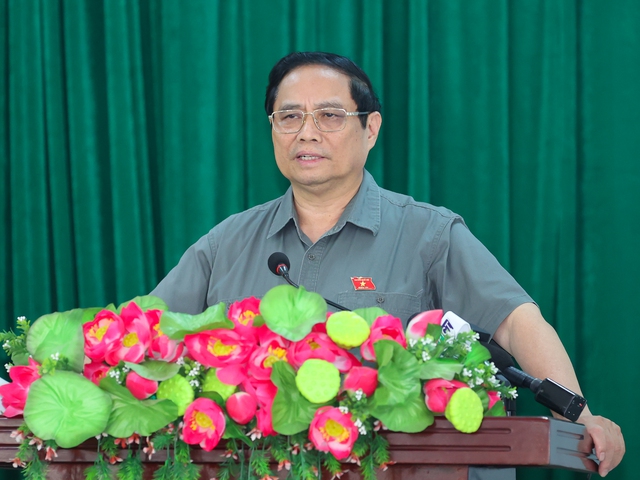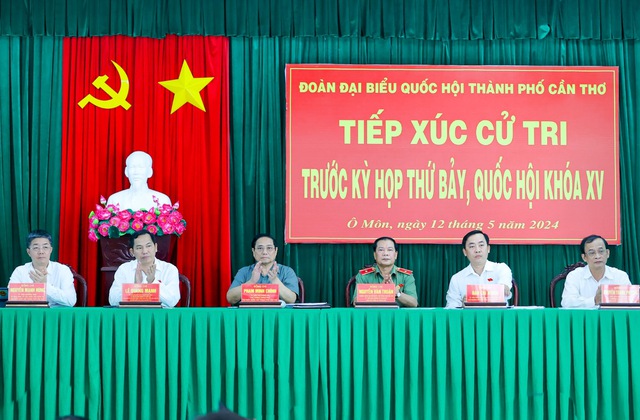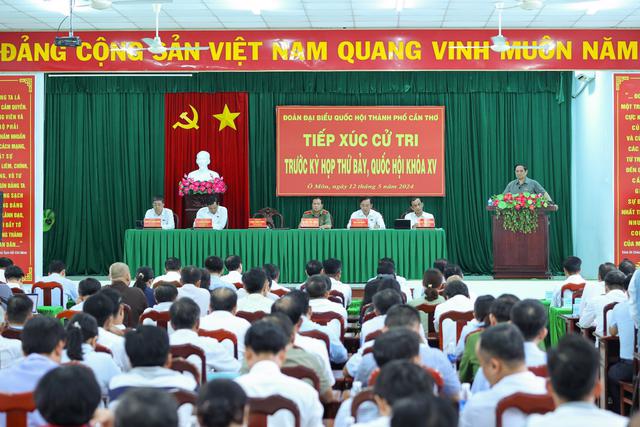In a significant engagement with voters in Can Tho City, Prime Minister Pham Minh Chinh provided a comprehensive overview of Vietnam's economic performance and social progress in the first four months of 2024.
The address on May 12, held ahead of the 7th session of the 15th National Assembly, detailed the government's proactive measures to navigate a complex global landscape while ensuring economic stability, social welfare, and sustainable growth.
Prime Minister Chinh acknowledged the multifaceted challenges facing Vietnam, including the unpredictable global economic climate, geopolitical tensions, and the escalating impacts of climate change.
Despite these headwinds, Vietnam's economy has shown remarkable resilience, with positive growth across key sectors. Industrial production has surged by 6%, a stark contrast to the 2.5% decline witnessed during the same period last year.
This resurgence underscores the effectiveness of the government's policies in stimulating economic activity and fostering a conducive business environment.
Tourism Rebounds, Exceeding Pre-Pandemic Levels
The tourism sector has also experienced a robust recovery, welcoming 6.2 million international visitors in the first four months of 2024. This represents a substantial 68.3% increase compared to the same period in 2023 and even surpasses pre-pandemic levels by 3.9%.
The revitalization of tourism not only bolsters economic growth but also reinforces Vietnam's appeal as a global destination.
A cornerstone of the government's economic strategy has been maintaining macroeconomic stability.
Prime Minister Chinh emphasized that inflation remains under control, the budget deficit is manageable, and Vietnam has achieved a trade surplus of VND 210.6 trillion (USD 8.4 billion) in the first four months of 2024.
Additionally, the nation has successfully ensured energy security and food security, safeguarding the well-being of its citizens.
Infrastructure Development and Strategic Investments Drive Growth
Infrastructure development has been a top priority, with a nationwide drive to expedite the construction of expressways and other critical projects.
This ambitious undertaking not only enhances connectivity and facilitates economic activity but also demonstrates the government's commitment to modernizing the nation's infrastructure.

Strategic investments have also been prioritized, attracting VND 235.2 trillion (USD 9.27 billion) in foreign direct investment (FDI) during the first four months, a notable 4.5% increase compared to the same period last year.
Prime Minister Chinh underscored the government's dedication to social progress and environmental protection.
Nearly 18,500 tons of rice have been distributed to support vulnerable communities, and 94.8% of households report stable or increased incomes compared to the same period last year.
These figures highlight the government's efforts to ensure social welfare and create a more equitable society.
Addressing Challenges and Charting a Path Forward
The Prime Minister candidly acknowledged the challenges that lie ahead, including the need to further control inflation, address the difficulties faced by some businesses and vulnerable populations, and mitigate the impacts of natural disasters and climate change.
He also recognized the ongoing work required to enhance the implementation of laws and policies, strengthen the capacity of government officials, and streamline administrative processes.
To address these challenges and build on the successes achieved thus far, Prime Minister Chinh articulated nine key priorities for the upcoming period.
These priorities are far-reaching. They include maintaining macroeconomic stability and fostering new growth drivers. Accelerating public investment and developing key sectors are also emphasized.
The government is committed to prioritizing social and environmental issues, combating corruption and bureaucracy, and strengthening national defense and security.
Additionally, promoting international integration and enhancing communication and consensus-building remain key objectives.

Can Tho's Role in Regional Development
In his address to voters in Can Tho City, the Prime Minister emphasized the city's pivotal role in the Mekong Delta region.
He outlined a roadmap for Can Tho's development, emphasizing the mobilization of resources, the promotion of traditional and new growth drivers, investments in human capital, and the strengthening of regional and international connectivity.
He also highlighted the need for Can Tho to develop strategic infrastructure, foster industrial development, and cultivate innovation and entrepreneurship.
The engagement with voters in Can Tho City was not limited to broad policy outlines.
The Prime Minister and other government officials took the time to address specific concerns raised by the constituents, demonstrating the government's commitment to transparency, accountability, and responsiveness.
Issues such as waste management, infrastructure development, energy projects, and measures to mitigate the impact of drought and saltwater intrusion were thoroughly discussed, with concrete solutions and commitments presented.
This comprehensive and transparent engagement with voters serves as a testament to the government's unwavering dedication to serving the Vietnamese people.
As Vietnam navigates a complex and ever-changing global landscape, Prime Minister Chinh's steadfast focus on economic resilience, sustainable growth, and social progress provides a clear and inspiring vision for the nation's future.









 Google translate
Google translate